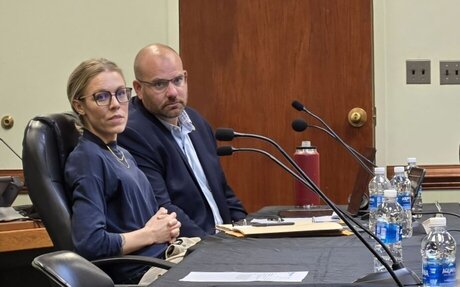|
|
0 8 . 2 6 . 2 5
All Access
5 items
|
|
|

|
Litigation
A Richmond judge will take a look at two government-issued cell phones to help settle a bitter legal dispute over whether the city has or hasn’t turned over all text messages relevant to the 2024 firing of former public records official Connie Clay. Attorneys for Clay — who sued the city last year after she was fired from her role as Richmond’s Freedom of Information Act officer — argued in court Monday that they have reason to believe there are some text messages still missing from the evidence the city has had to produce for the lawsuit. “We need to know what is still on those phones and what isn’t,” said Sarah Robb, an employment lawyer representing Clay. An outside lawyer representing the city and former city spokeswoman Petula Burks disputed that claim, calling the issue a “red herring” and insisting the city has already given Clay’s lawyers everything there is to give. As the two sides stopped just short of accusing each other of spreading falsehoods, Judge Claire Cardwell said she would take it upon herself to review the work phones of Clay and Burks, Clay’s former boss.
|
|
|

|
State
The Virginia legislature approved state requirements in 2024 for reporting annual deaths in custody numbers. It’s a backstop for a federal law called the Death in Custody Reporting Act. Del. Cia Price (D-Newport News) sponsored the state bill, and the Department of Criminal Justices Services released its first report under the statute in July. In total, 194 deaths were reported across the commonwealth. While that number is intended to be comprehensive and the DCJS report found its data collection process was performing well, 16% of law enforcement agencies did not provide full data. In response to emails seeking the missing deaths-in-custody numbers, a DCJS spokesperson said the department has data from jails, but not prisons, for those years and cited a Washington Post database as a source for additional information.
|
|
|

|
Local
The Lynchburg City Council is returning from a seven-week summer break with a work session and general meeting on Tuesday. There will be two presentations regarding proposed amendments to the rules of procedure: one led by City Attorney Matthew Freedman and Clerk of Council Alicia Finney, and one led by Councilmember Jacqueline Timmer. Some of their changes address citizens’ participation in council meetings, such as preventing attendees from approaching the dais and allowing city residents to address the council before nonresidents during public comment and in public hearings. Other proposed amendments address voting procedure for council members. All motions require a majority vote to pass “unless otherwise noted,” according to the current rules of procedure. Under the proposed amendments, three kinds of council decisions that currently require a two-thirds vote to pass could be changed to require just a majority to pass.
|
|
|

|
Local
The Halifax County Board of Supervisors voted to approve the contract for an emergency interim county administrator/finance director — Tomeka Morgan — at an emergency called meeting Monday evening. Supervisor Robbie Smart, who opposed the motion, remarked in the comments prior to the vote that per Morgan’s contract, she will earn a salary of $25,500 per month to work two days a week for Halifax County, as she works elsewhere two days per week.
|
|
|

|
Local
Two former Halifax County employees — former Animal Control Chief Warden Catherine Martinette and former Animal Control Lt. Laura Midkiff — have filed civil lawsuits against the members of the county board of supervisors who fired them in March 2024. The reason for the lawsuits is cited as “wrongful retaliation against plaintiff in violation of Virginia Code 2.2-3011, which provides that “no public employer, including counties, may discharge, threaten, or otherwise discriminate or retaliate against a whistle blower’s disclosures of wrongdoing or abuse.” The lawsuits further allege that at public meetings of the board of supervisors occurring from 2022 through 2024, citizens who were “friends and political allies of defendants” began appearing to “publicly condemn” the actions of the plaintiff. “Upon information and belief, these citizens were encouraged to speak out directly against plaintiff and her department by the defendants,” the lawsuits further allege in the statement of facts.
|
|
|
|
|
|
|
|
|